July 19, 2024 – Hanoi, Vietnam Day 1, Van Phuc Pagoda, Dharma Q&A with Korean expatriates
Hello. For the next two days, Sunim will be visiting various temples in Hanoi, the center of northern Vietnam, to share Dharma Q&A and give Dharma Q&A for Korean expatriates.
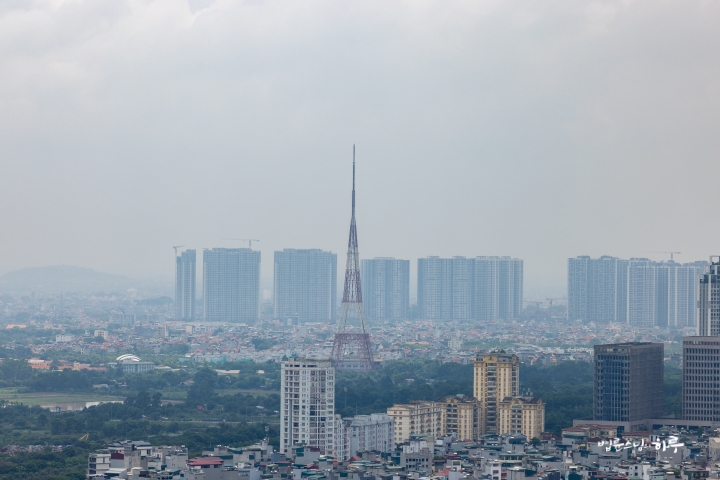
Sunim finished his morning practice and meditation, then left the accommodation at 6:40 AM to head to Van Phuc Pagoda.
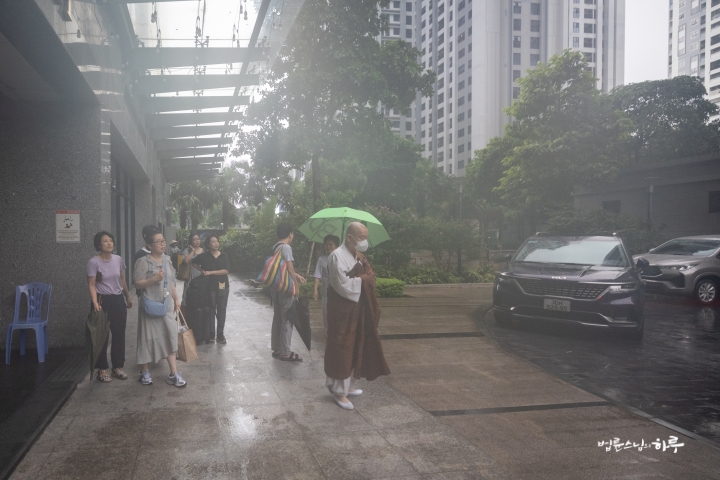
This visit to Hanoi follows the previous visit to Ho Chi Minh City, at the invitation of the Vietnamese Buddhist Sangha Council. While Ho Chi Minh City has the 2nd Secretariat of the Vietnamese Buddhist Sangha Council, Hanoi has the 1st Secretariat. We planned to visit several temples centered around the 1st Secretariat over the next two days.
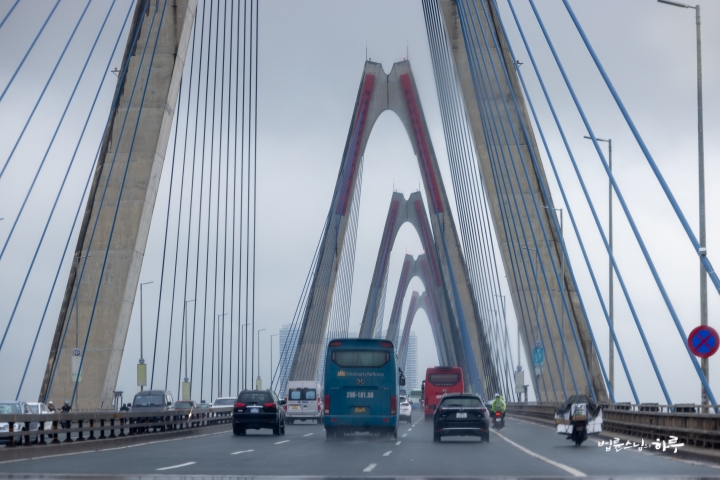
We left early due to expected traffic, but arrived 40 minutes earlier than planned. Upon arrival at the temple, lay followers lined up on both sides and chanted Buddhist prayers in beautiful voices.
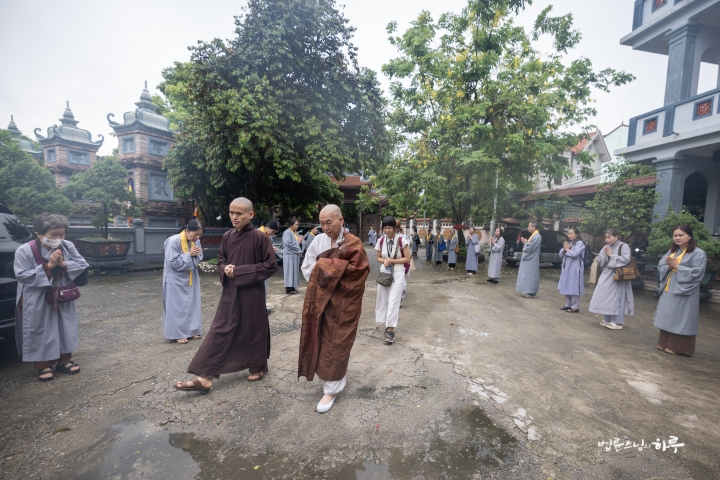
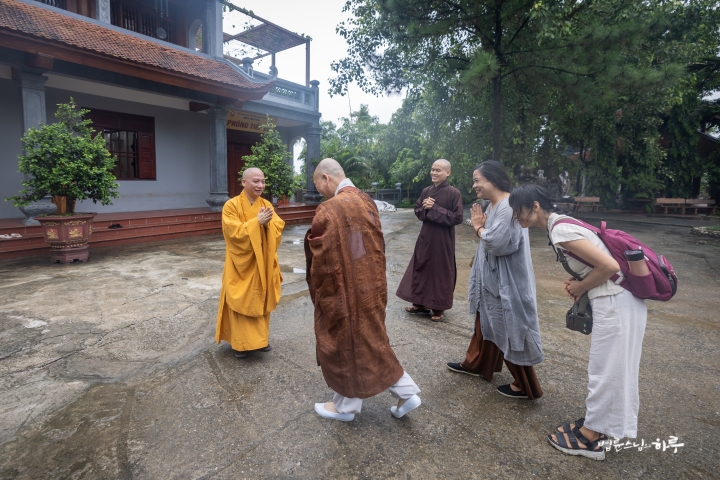
Guided by the abbot, we first had tea and exchanged greetings in the reception room. The abbot expressed deep gratitude for Venerable Pomnyun Sunim’s visit.
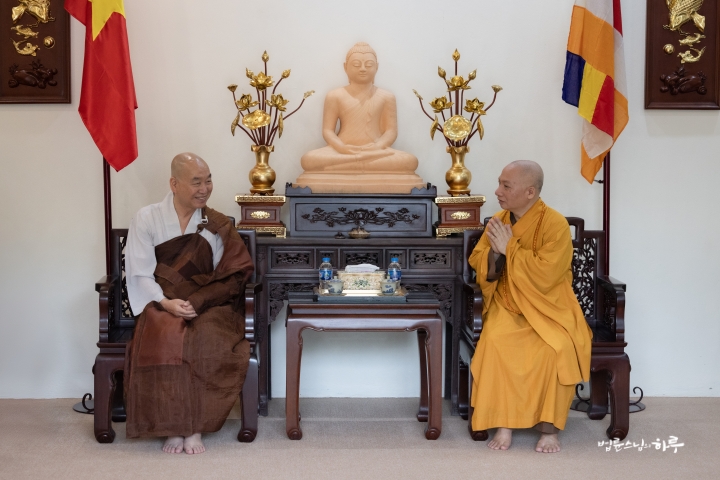
“Thank you so much for visiting our temple as soon as you arrived back in Vietnam.”
Sunim also expressed his gratitude.
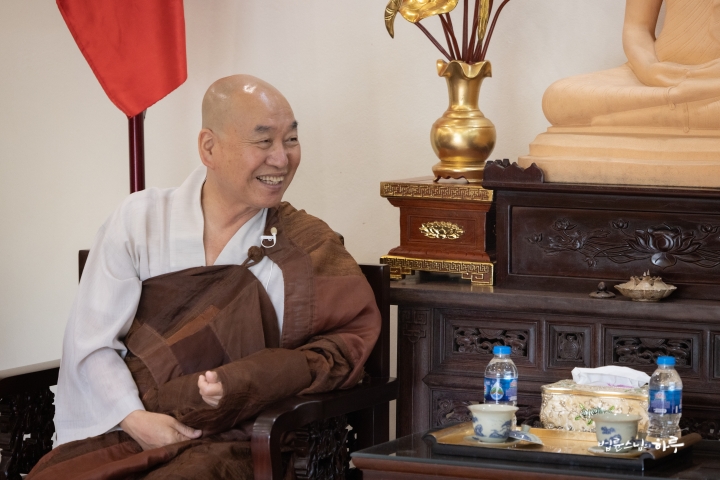
“Thank you for allowing me to visit. I’ve had many opportunities to meet with officials from the 2nd Secretariat during my frequent visits to Ho Chi Minh City. However, this is my first visit to the 1st Secretariat here in Hanoi.”
“Venerable Thich Nhat Tu has sent me many videos, so I’ve seen a lot of your activities. I learned that you are doing many good things globally. I came to respect you for your social engagement for sentient beings and for giving many Dharma Q&A. I’ve also been to Seoul, and it left a very good impression on me. My experiences of seeing and hearing in Korea have greatly influenced the development of Vietnamese Buddhism.”
“I’m concerned about visiting so suddenly. I’m sure all the monks have their own schedules.”
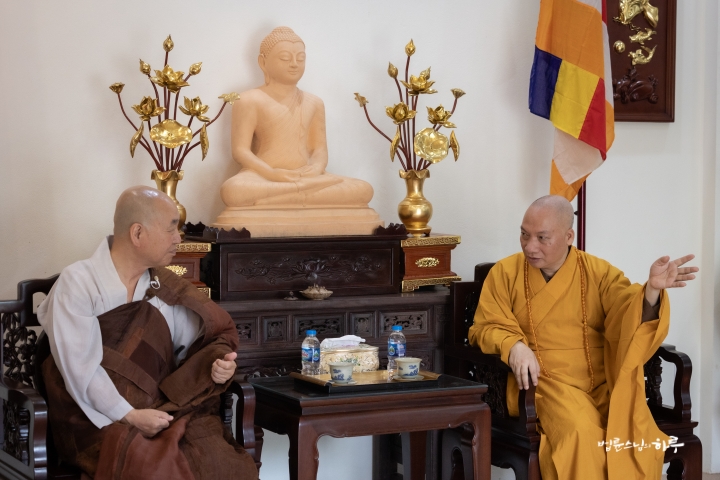
“It’s fine. Since it’s currently the rainy season retreat period, all the monks are already gathered here, so it’s a good opportunity to have conversations with everyone at once.”
After finishing tea, we moved to the Dharma Q&A venue, led by a monk carrying a bell and incense, following Vietnamese Buddhist traditional rituals.
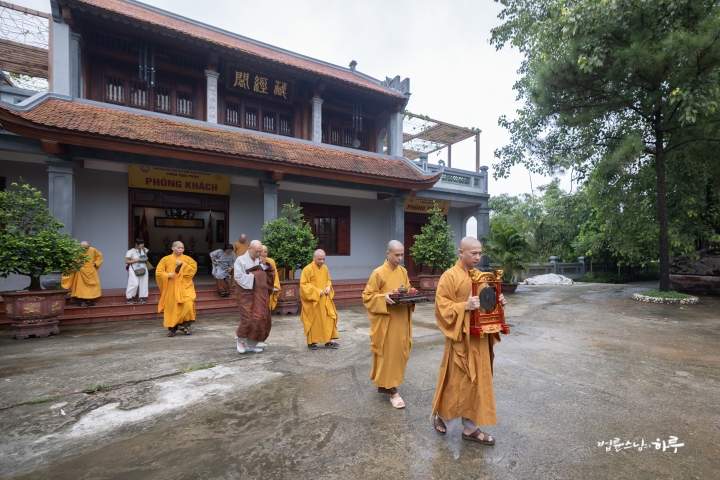
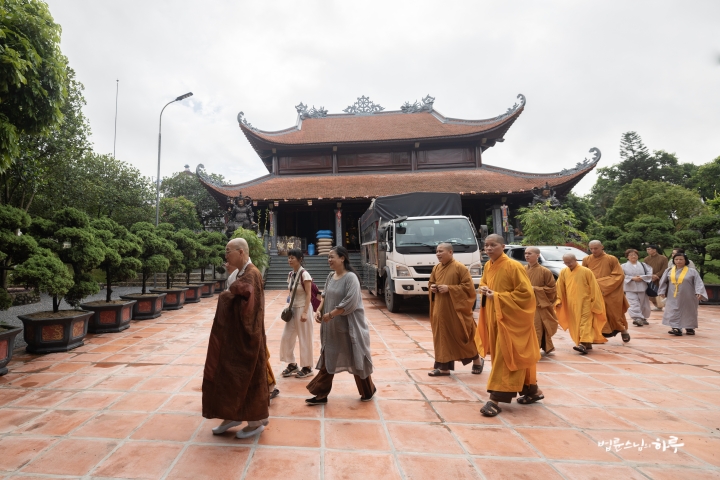
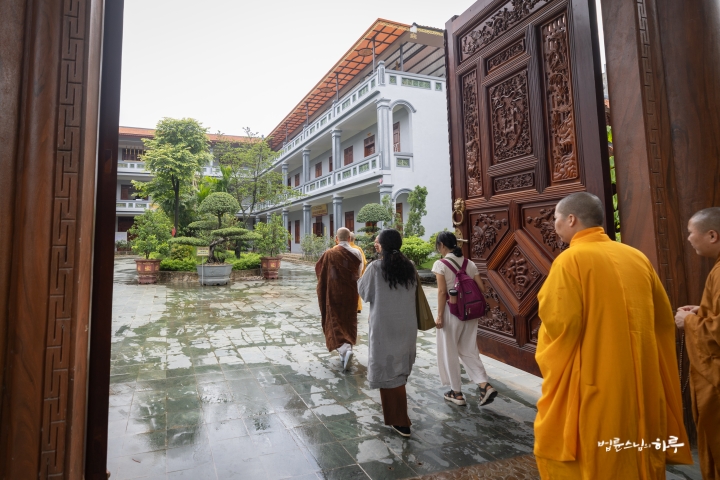
On the way, we paid respects at the main hall, then circled around the temple before heading to the lecture hall. Upon arriving at the hall, about 100 monks and followers began chanting.
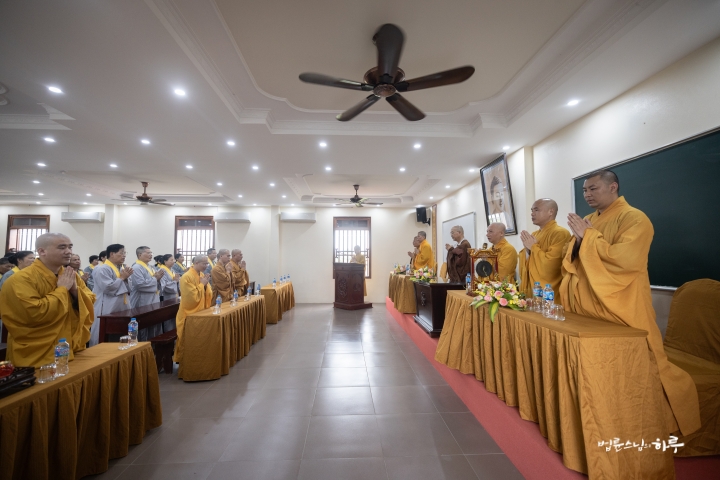
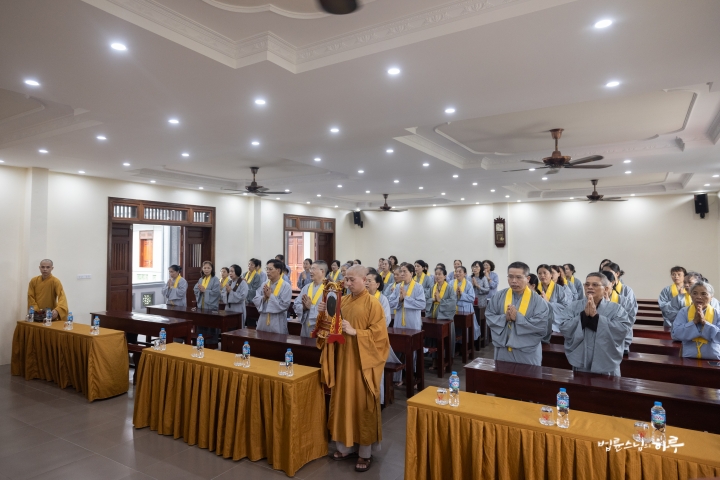
After finishing the Buddhist ceremony, the abbot introduced Venerable Pomnyun Sunim to the people, explained what Van Phuc Pagoda is doing, and then requested a Dharma Q&A from Sunim.
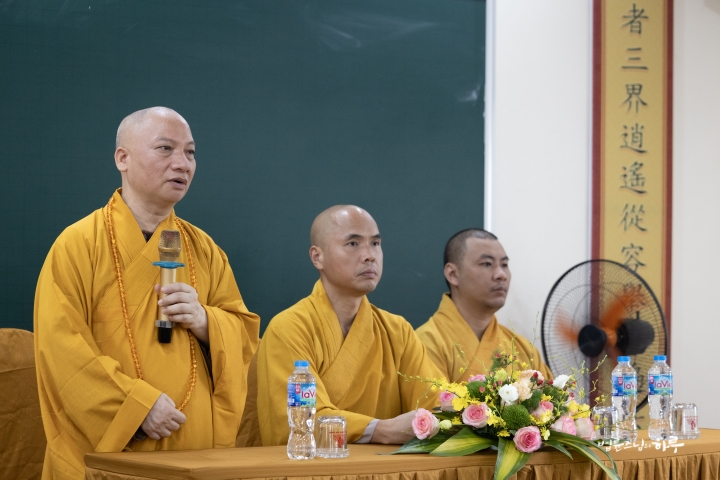
“There are about 3,000 large and small temples in Hanoi. Among them, there are 20 temples where monks gather for the rainy season retreat, and Van Phuc Pagoda is one of them. Monks gather here for 3 months a year to read scriptures, study, and practice. Today, we would like to learn from Venerable Pomnyun Sunim’s experience and know-how by having him introduce in detail the activities that Jungto Society is doing.”
Then Sunim began his Dharma Q&A.
Praying For Active Exchange And Cooperation Between Korean Buddhism and Vietnamese Buddhism
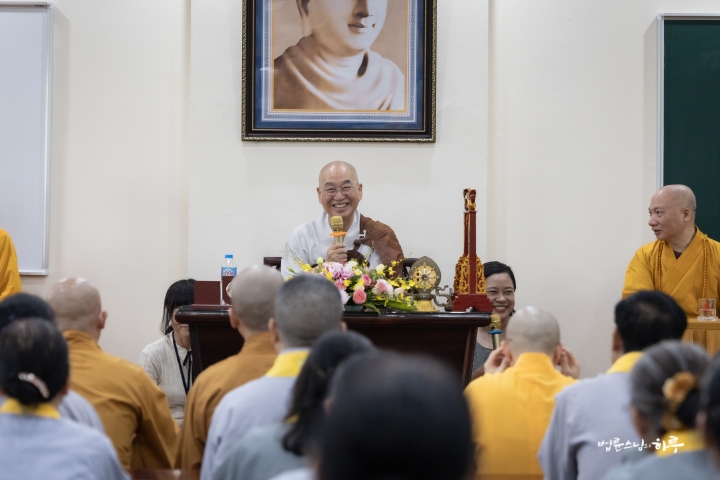
“Currently, Korea and Vietnam are engaging in a lot of exchange and cooperation. There are about 200,000 Koreans living in Vietnam, and about 300,000 Vietnamese living in Korea. In Korea, there are about 100,000 who came for marriage, 100,000 who came to work, and about 100,000 who came to study. This is the second largest number of foreigners living in Korea, excluding those of Chinese descent. That’s how much exchange and cooperation is happening between Korea and Vietnam right now. However, compared to this economic and tourism cooperation, there is still not much exchange in terms of Buddhism. I visited hoping that there would be more exchange and cooperation between Korean Buddhism and Vietnamese Buddhism in the future.
I was invited by the Vietnamese Buddhist Sangha Council and visited Ho Chi Minh City in March last year. I visited several temples, had conversations with monks, and paid my respects to the Chairman of the Buddhist Sangha Council. Then I invited all of them to Korea, and last October, the Chairman and Vice Chairman of the Buddhist Sangha Council visited Korea. At that time, we promised to further promote Buddhist exchanges between Korea and Vietnam and to help each other’s citizens in both countries. There are currently 4 Vietnamese temples in Korea. And there are even more gatherings of Vietnamese Buddhists that take place in Korean temples, although they haven’t established independent temples. So I promised to help Vietnamese people in Korea, and the Vietnamese Buddhist Sangha Council promised to help Korean people living in Vietnam.
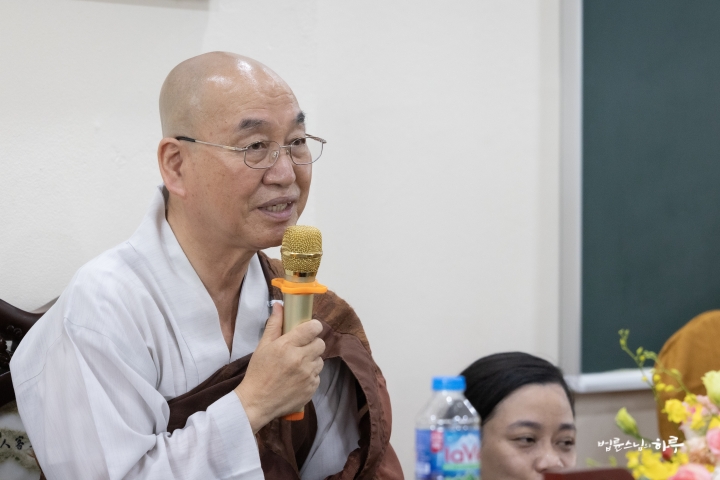
And I visited Ho Chi Minh City again twice in March and June this year to have conversations and exchanges with monks. The Buddhist Sangha Council said that since they have the 1st Secretariat in Hanoi as well as in Ho Chi Minh City, it would be good to visit Hanoi and have conversations together. I’ve visited Hanoi several times to give lectures for Koreans living here, but I’ve never visited a Vietnamese temple. So this visit to Van Phuc Pagoda is my first temple visit in Hanoi. I will visit more often in the future. I also hope that many monks will be invited to Korea so that we can have exchanges with each other.”
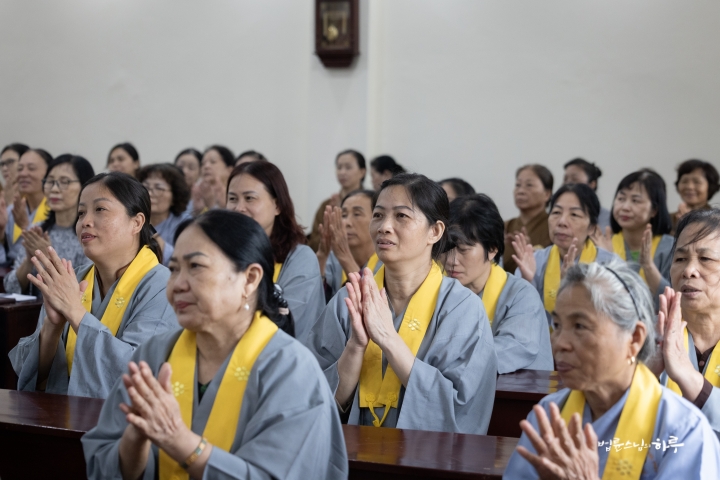
Everyone applauded loudly, anticipating exchanges between the two countries.
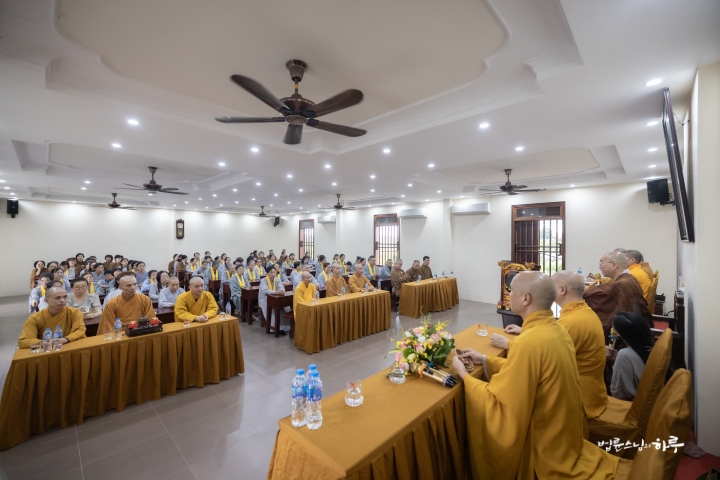
Various Methods And New Attempts to Spread Buddhism
“I am doing Buddhist propagation a bit differently in Korea. In Korea, most Buddhist followers only think about going to temples to pray for blessings, and they think that only monks practice. However, I thought that everyone, including lay followers, should practice. So I guide all members of Jungto Society to practice for an hour every morning before going about their daily lives.
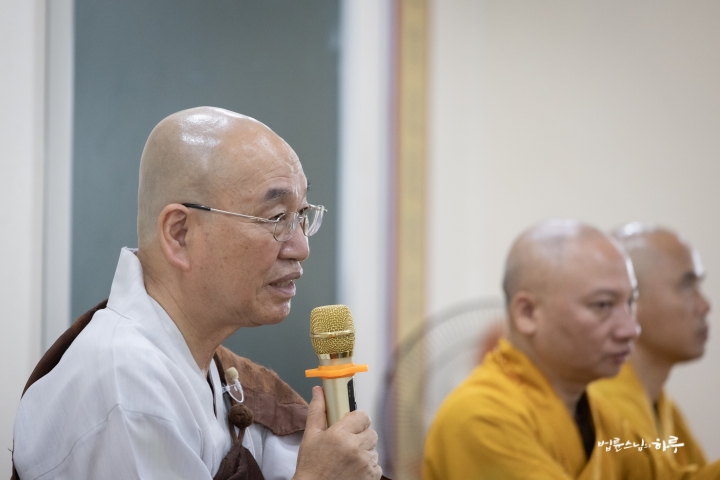
And while Christianity is very enthusiastic about missionary activities, Buddhism often focuses only on self-practice. However, I think this good Dharma of the Buddha should be spread to many people, so I consider propagation very important. And I think that Buddhism should not just stay within temples but should go out into society and do many volunteer activities that society needs. So we are doing a lot of work to help poor people. We are providing support not only in Korea but also in all Asian countries including Southeast Asia and Southwest Asia.
And as you all know, Korea is divided. There is always a risk of war. So we are also doing peace activities so that South and North Korea can live peacefully. We are also doing humanitarian aid activities to support people in North Korea, transcending ideology.
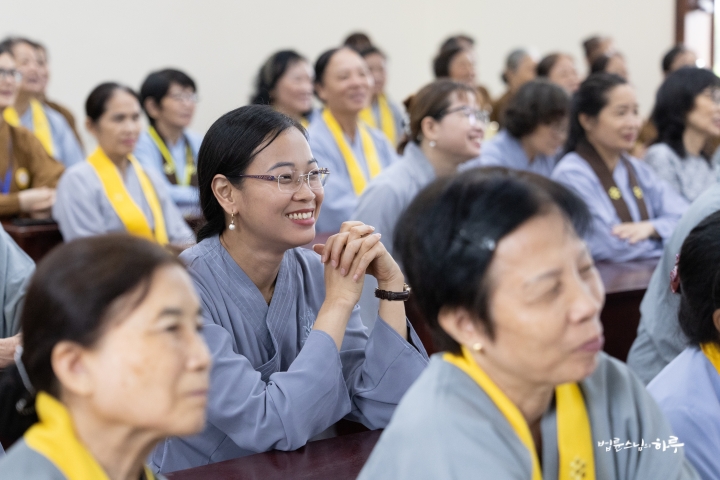
And the biggest problem on Earth right now is the climate crisis. So we are promoting a movement to live frugally with the motto ‘Eat less, wear less, use less’. These days, people think that spending a lot is living well. If this continues, an environmental crisis will come where our descendants will no longer be able to survive. The resources of this world are not just ours. They are resources that our descendants must use for generations to come. We need to use them sparingly so that our descendants can live too. So we are aiming for a life that does not produce waste and are practicing in various ways. We don’t make a lot of food and leave leftovers, but make less and eat a little less than enough. So eating less is also good for health. Also, in the past feudal era, women were discriminated against compared to men. But now we are also campaigning that we should no longer discriminate based on gender, and we should not discriminate against people with disabilities. We are doing these various social activities.
The Buddha’s Teachings Should Apply to All People
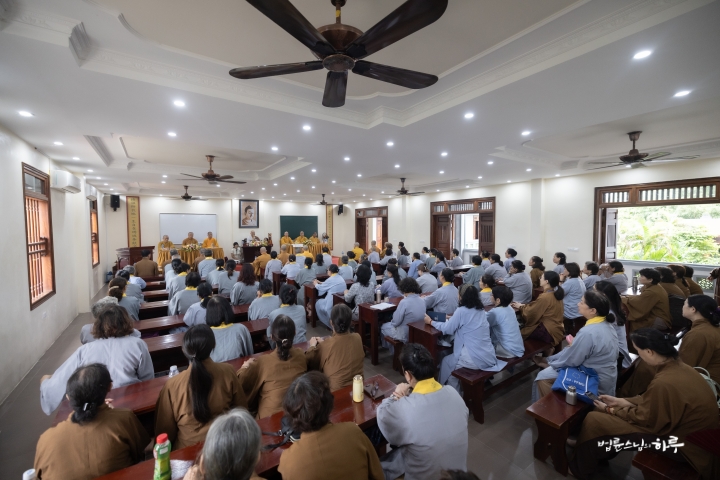
I think the Buddha’s teachings should not be limited to a few, but should be applied to all people to help many people live happily. Especially these days, young people are moving away from religion. So we are also doing activities to help solve their anguish while talking with young people. These days, young people find it difficult to come to gatherings. So we are connecting online so that they can study the Dharma from where they are. We have opened all Buddhist university programs online. We guide people to make one room in their house into a personal Dharma hall and practice in their daily lives. Now we don’t need to create large spaces anymore. There are many people living alone in Korea these days. So we make it possible for them to meditate by connecting online from their homes. We are also promoting the movement ‘Let’s make the house we live in a place of practice’. And we are utilizing various modern technologies to spread the Buddha’s teachings more easily and widely. Moving away from doctrine-centered approaches, we receive questions about the difficulties, anguish, and stress that people experience in their lives, and help solve those difficulties through dialogue.
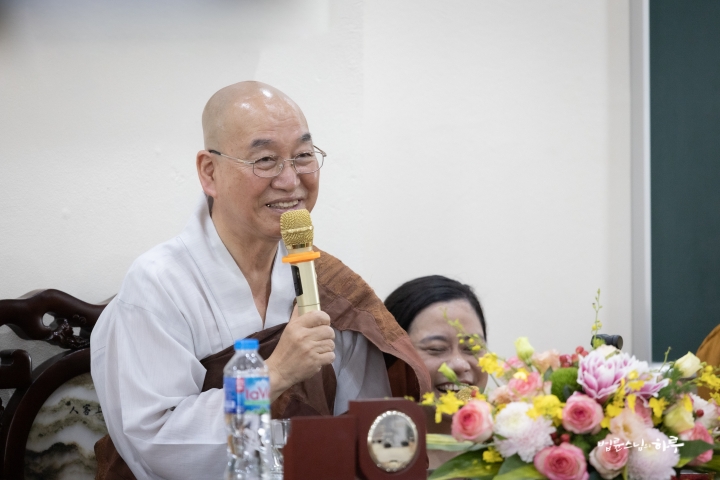
I am older than you and have been active for a long time, so I would like to share my experiences if they are needed for your propagation activities. If you have any difficulties in studying Buddhism, practicing, and propagating, let’s talk about them, whatever they may be.”
Then he took questions. Anyone could raise their hand and ask Sunim a question. Five people asked questions on various topics, and Sunim shared the experiences of Korean Buddhism and Jungto Society, talking about how Vietnamese Buddhism can continue to develop.
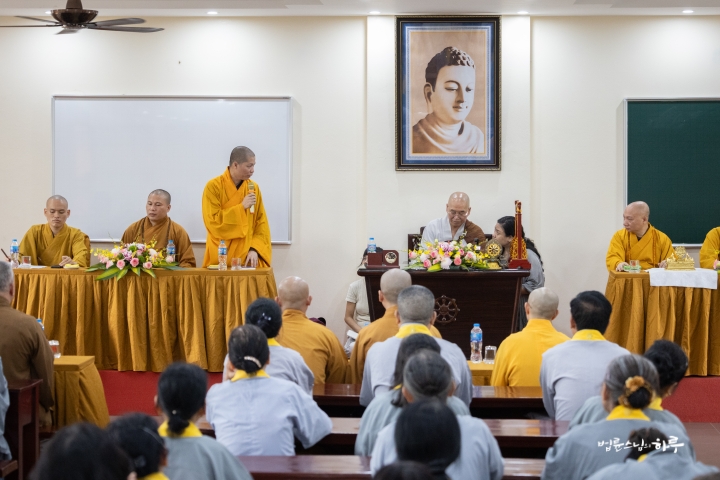
There May Be a Gradual Decrease in Buddhist Followers in Vietnam in The Future. What Preparations Should Be Made?
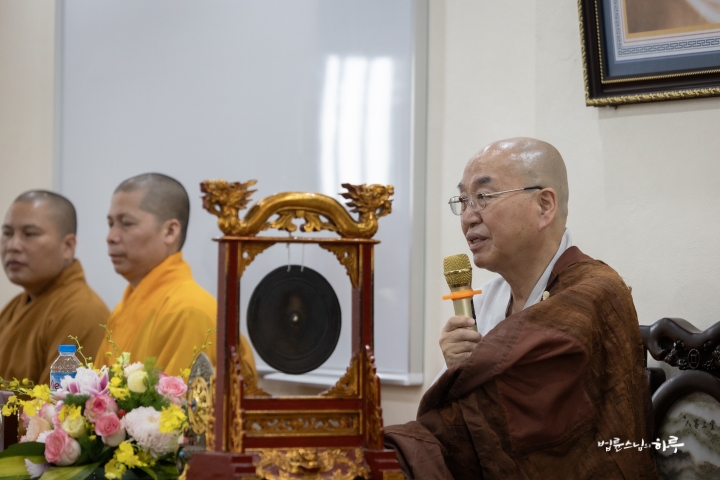
“I recently attended the opening ceremony of a female student dormitory at the Royal University of Buddhism in Cambodia. The interpreter was a priest. The priest said that currently, Vietnam is the country with the highest number of people becoming priests in the world. In Vietnam, not only are there many people becoming monks, but there are also many becoming priests. This is a phenomenon that appears as Vietnam develops. In Korea too, 20 years ago, there were many people becoming monks and priests. But in 20 years, that number has decreased tremendously. So the reason why there are many people becoming monks in Vietnam now is not because Buddhism is doing well, but it’s a phenomenon of overall social change. Because there are also the most people becoming priests. Don’t be mistaken that it’s because Buddhism is doing well.
Now, as the economy grows like in Vietnam, temples are built large, and the lives of monks living in temples become comfortable. Then they turn a blind eye to helping the poor and keep investing in building temples. So temples become more and more luxurious. Monks also become extravagant and wealthy. This may seem like a good thing temporarily, but in the long run, it leads to a very big disaster. If monks ride good cars and live wealthy lives, people may not say it outwardly, but inwardly they feel resistance. Especially young people feel a lot of resistance. Older people think ‘We should give the best of everything to monks’, but young people don’t think that way.
So I think that instead of building temples, we should start propagation now by creating propagation halls in front of industrial complexes or schools. This is my suggestion based on Korea’s experience. When I was young, I appealed this content to the Korean Buddhist community several times, but the denomination ignored it. As a result, Korean Buddhism has now lost its initiative in Korean society. Just comparing the number of religious believers, Christianity has become much more numerous, and especially among social leaders, Christianity is absolutely dominant. Politicians, administrative officials, these leaders mostly believe in Catholicism or Protestantism.”
“Thank you.”
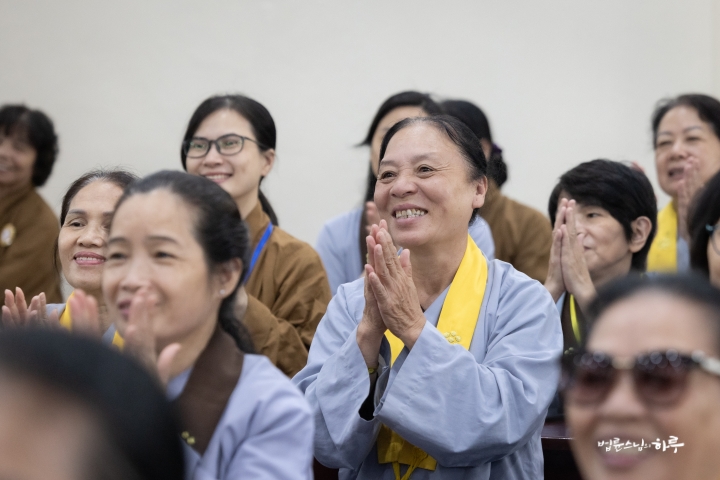
The questions continued.
• When I went to Korea, I saw that temples were not in cities where many people live, but mostly in the mountains. What is the reason for this?
• You have visited Vietnam several times and often met Vietnamese people and monks. I’m curious about your impressions.
• How can we solve the problem of Vietnamese people abroad converting to other religions?
Answering the questions took an hour and a half. There were monks who wanted to ask more questions, but due to the need for interpretation, not many questions could be taken. After finishing the Dharma Q&A, the abbot expressed his gratitude.
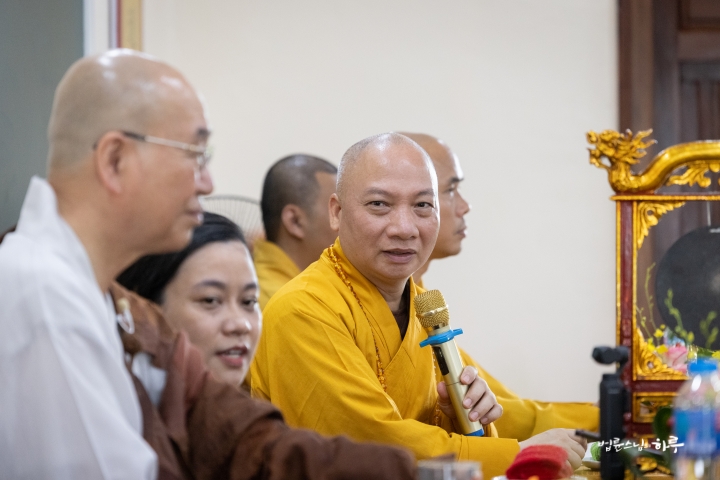
“Thank you very much for sharing the experiences of Korean Buddhism and Jungto Society. Although it was a short time, we were able to learn a lot. I request that you visit Hanoi more often in the future, not just this time.”
The Dharma Q&A ended with a big round of applause. The abbot presented a gift to express his gratitude.
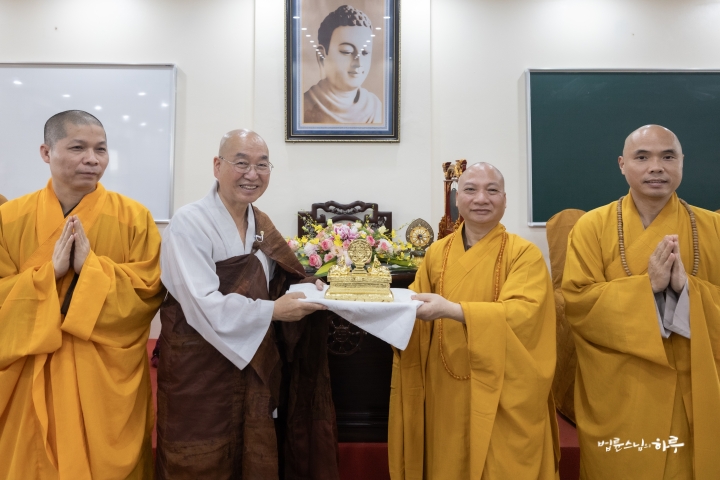
Sunim took a commemorative photo with everyone and left the auditorium.
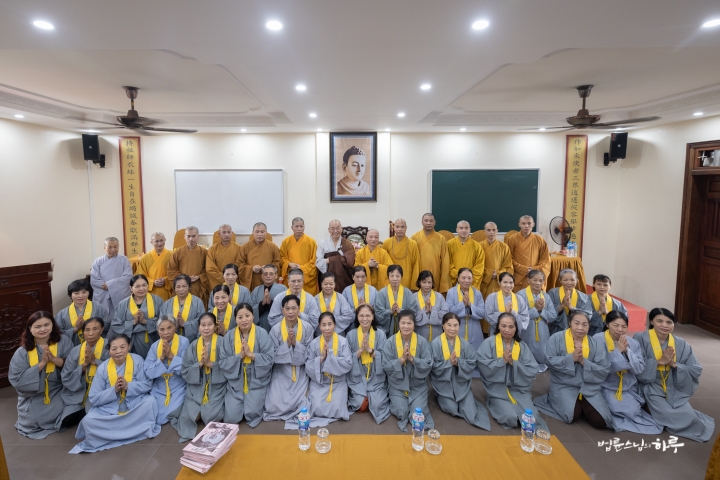
The abbot led Sunim by the hand to the hall where the patriarchs are enshrined and told him about his teacher.
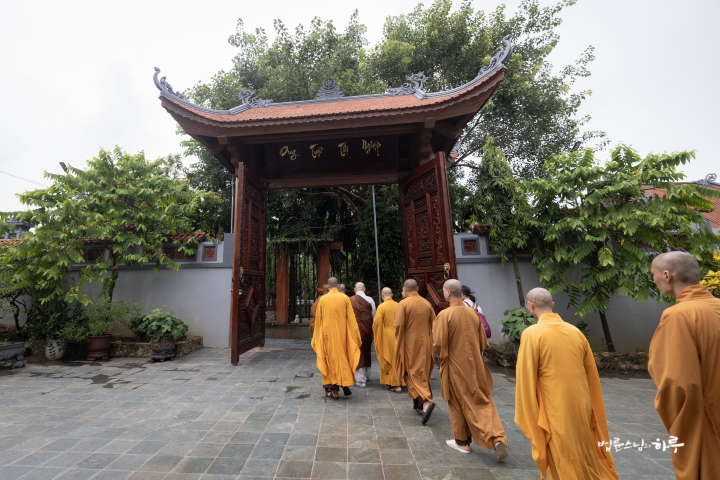
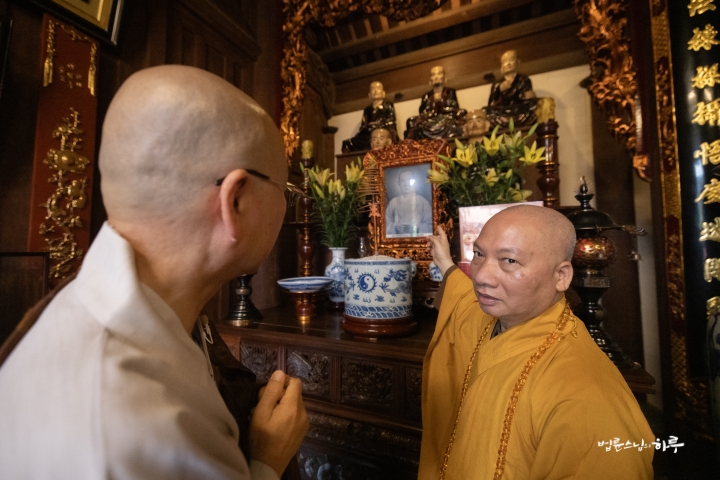
Sunim moved to another place and continued our conversation. The temple served fruits they grew themselves and tea. After more conversation, Sunim got up to leave.
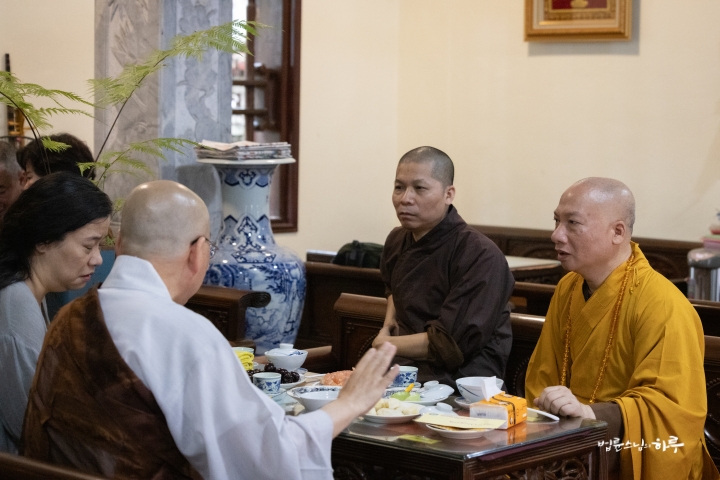
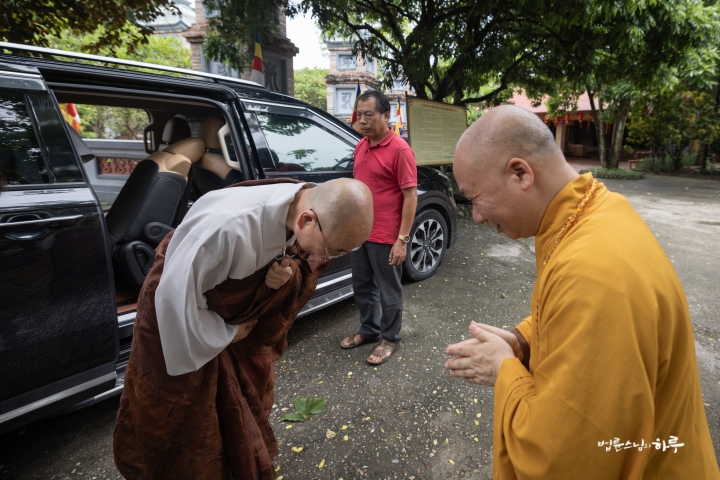
Sunim left Van Phuc Pagoda and headed to a restaurant to have lunch with officials from the Korean Association in Hanoi.
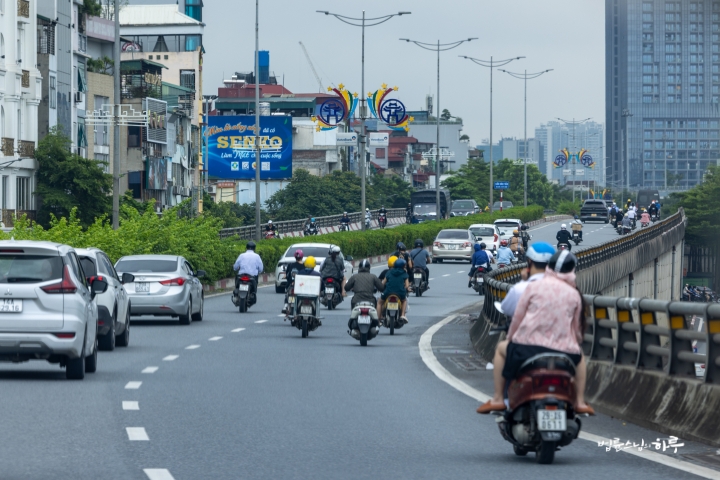
Upon arriving at the restaurant, Sunim were greeted by Jang Eun-sook, the president of the Korean Association, Lee San, the editor-in-chief of the Korean Association magazine, Lim Dong-seop, the chairman of the National Unification Advisory Council, and Nam Han-ik, the president of the Hanoi Real Estate Association.
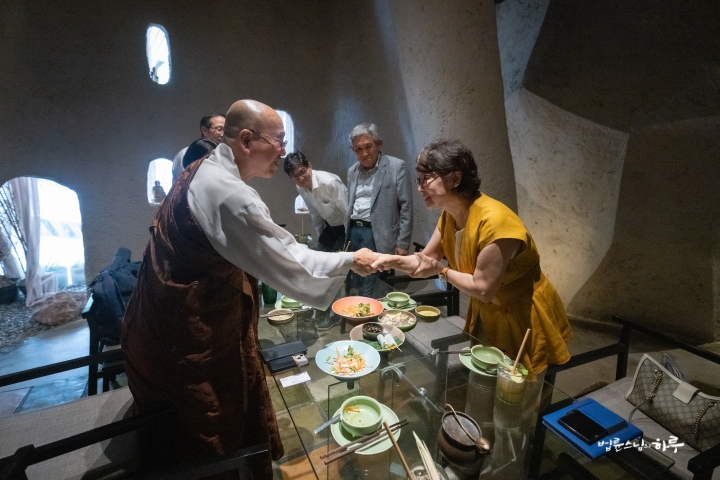
Lim Dong-seop, the chairman of the National Unification Advisory Council, who is in the clothing business, said he would like to donate 2,000 sportswear items. Sunim replied that he would look into whether the clothes could be donated to Bhutan. They also discussed the idea of not only donating clothes but also teaching clothing manufacturing skills to Southeast Asian countries supported by JTS.
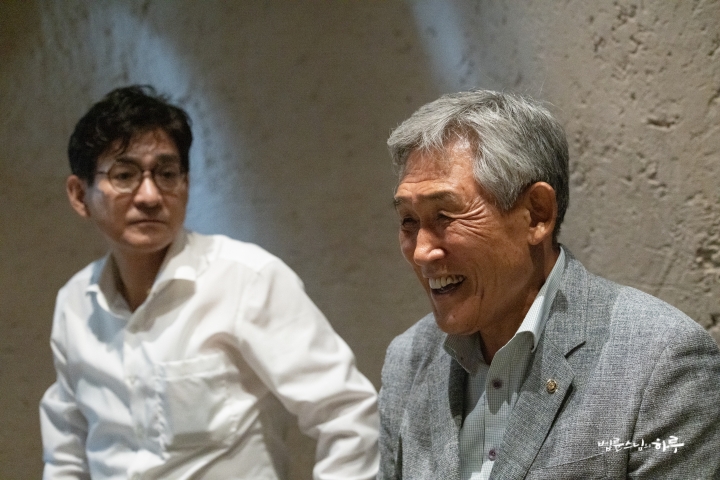
In particular, due to various internal circumstances in Vietnam, the Dharma Q&A scheduled for Korean expatriates this evening was canceled and will be conducted online instead. Sunim expressed his gratitude to the president of the Korean Association for her efforts to hold the lecture despite the difficulties.
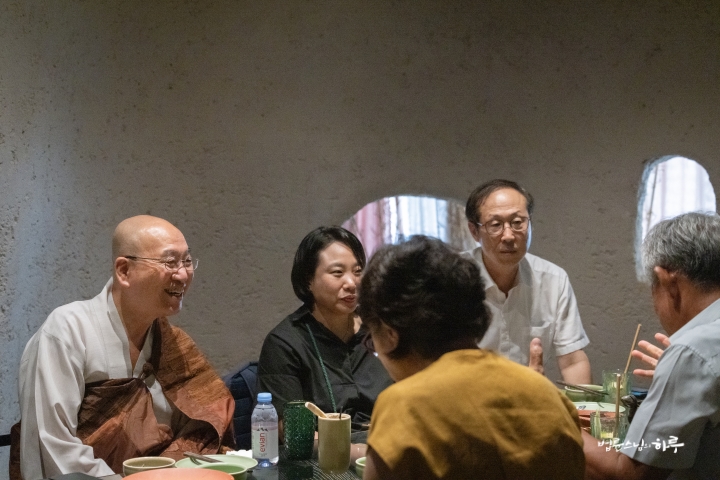
“I heard that the president of the Korean Association worked hard to make the lecture possible. Thank you.”
“It’s a shame that we can’t have the Dharma Q&A.”
“Well, life doesn’t always go as planned, does it?”
“Thank you for taking it lightly.”
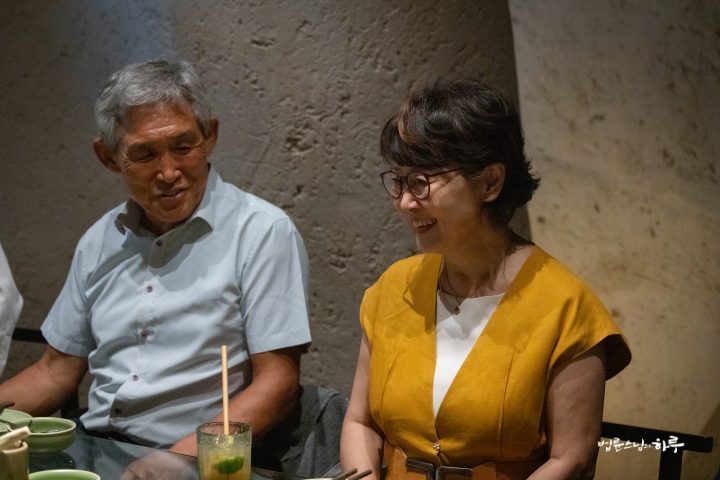
After finishing the meal, Sunim took a commemorative photo together.
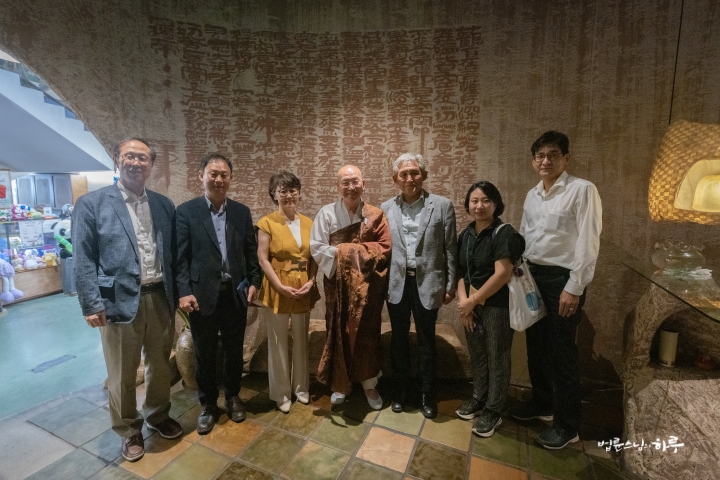
As Sunim’s physical condition continued to be poor, we moved to a nearby Jungto member’s house for a short rest before the evening Dharma Q&A.
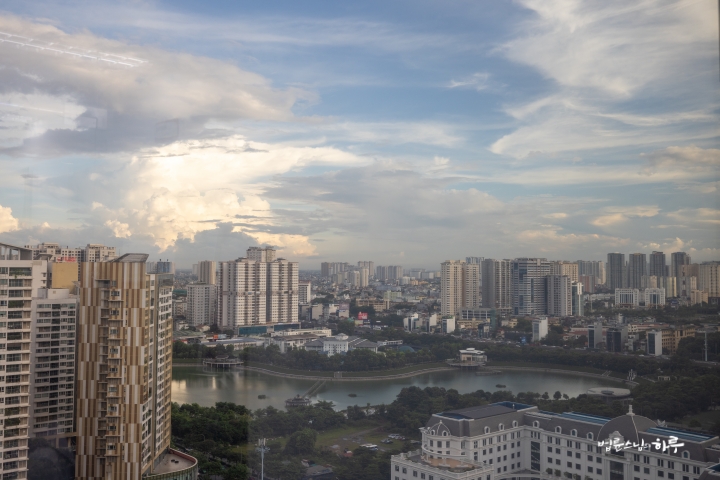
At 5 PM, we headed to the office of the Korean Association in Hanoi. Sunim needed a place with a good internet connection for the Friday Dharma Q&A live broadcast, and the Korean Association lent us their office space.
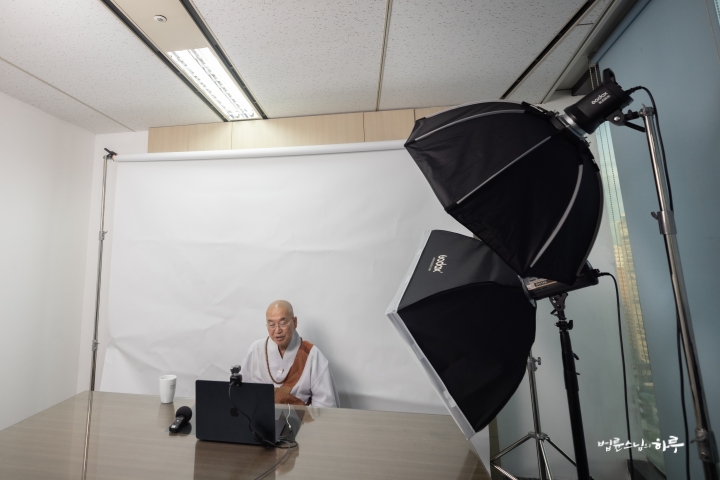
After setting up the broadcasting equipment, Sunim started the Friday Dharma Q&A live broadcast at 5:30 PM local time, which is 7:30 PM Korean time. Today, with about 3,400 people connected to the live broadcast, Sunim gave his opening remarks.
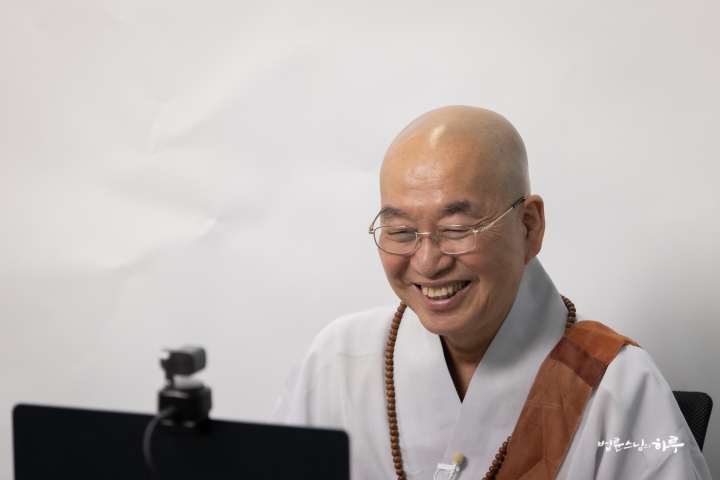
“I am spending the last part of my month-long Southeast Asian trip in Hanoi, Vietnam. Last week, I surveyed Bhutan and distributed necessities to flood victims in Assam, India. We’ll watch a short video of that and then continue our conversation.”
After watching the video together, Sunim started a conversation with those who had requested questions in advance.
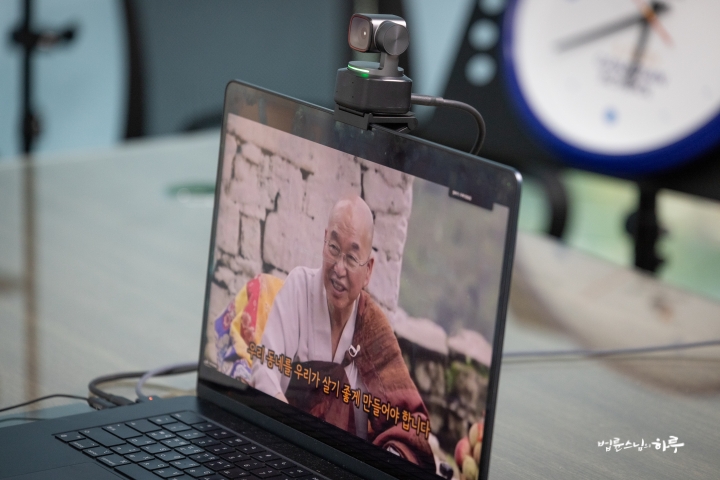
For an hour and a half, four people were able to ask questions and have a conversation with Sunim. After finishing the conversation, Sunim encouraged the questioners.
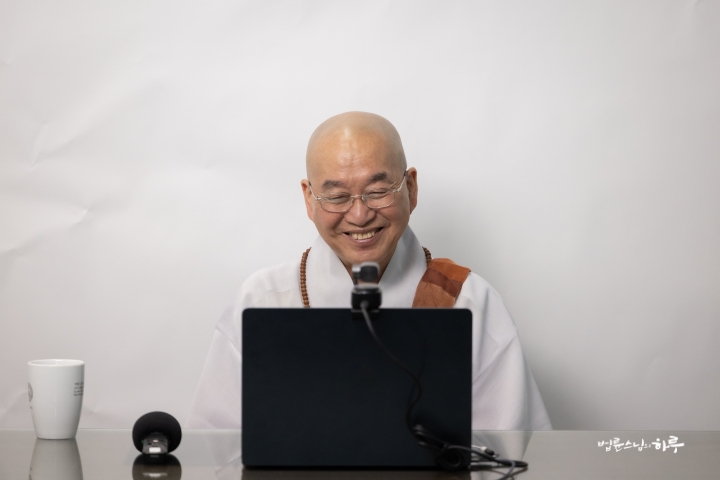
“Every living being in this world, no matter what kind of being, is worthy of respect. All beings are equal. It’s because we constantly compare ourselves to others that we develop feelings of inferiority and superiority. If we compare by height, the giraffe would be the most superior. If we compare by fighting ability, the tiger would be the most superior, and if we compare by speed, the ostrich would be the most superior. When we compare, every being in this world is both superior and inferior. If we don’t compare, no being is superior or inferior. So we should accept our own conditions and pursue our lives within them.
You Are All The Most Precious Beings in This World
There’s no need to say things like, ‘If only I had 10 million dollars, I could invest in such large-scale projects’ when you don’t have any money now, looking at businesses run by people with 10 million dollars. It’s also pointless to say, ‘If only I could see, I could do anything’ when you’re blind. If you can’t walk, saying ‘If only I could walk, I could go hiking’ is not something you can choose. Even if you can’t walk, there are things you can do in a wheelchair. Even if you can’t see, there are things you can do with your hands. Even if you’re short, there are things you can do. Even if you couldn’t go to school, there are things you can do. Even if you’re old, there are things you can do. Everyone has something they can do in their own way.
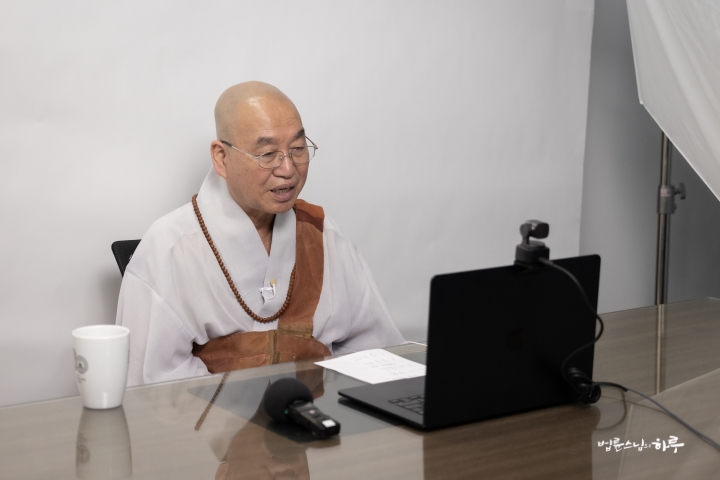
If a person over seventy wants to work like young people, they will feel inferior about being old and think of themselves as an inferior being. Older people have rich experiences. So they should look for work where experience is an advantage. That’s when they will value their own existence and feel self-esteem.
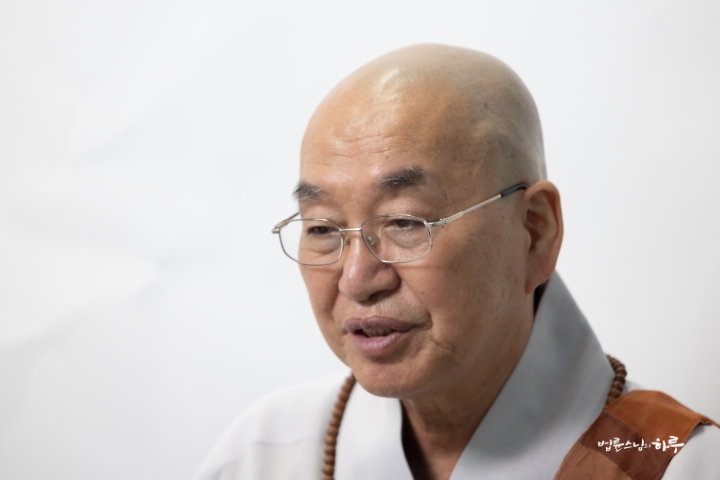
Don’t keep looking at others to live your life. Frogs should live as frogs, snakes as snakes, grasshoppers as grasshoppers – everyone should live according to their own existence. That’s how you realize the preciousness of your own existence. You are all precious beings. The Buddha said, ‘All living beings in this world are Buddhas.’ So I hope you know that you are precious beings and don’t treat yourselves carelessly. Thinking that you want to die because your husband died, or that you are an unnecessary being, these are mental illnesses. I hope you value yourself and live a life free from suffering.”
After finishing the live broadcast, sunim immediately moved to the conference room of the Korean Association next door to give the Dharma Q&A for Korean expatriates.
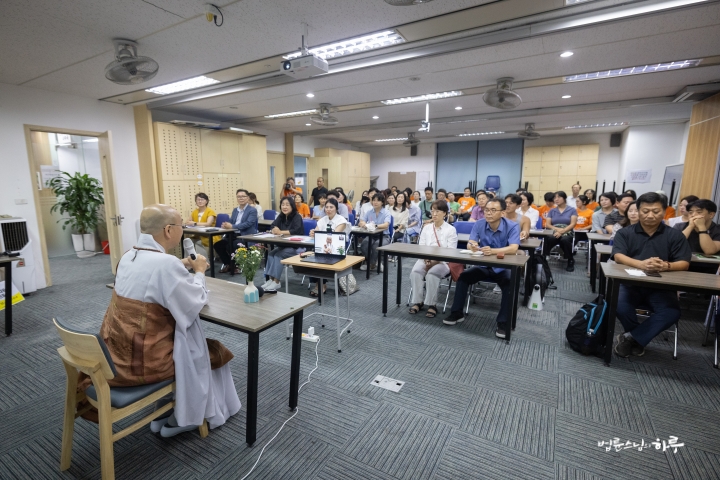
Originally, the large-scale Dharma Q&A was prepared for many expatriates at the Korean International School in Hanoi, but due to internal circumstances in Vietnam, it became impossible to hold the Dharma Q&A. It was a situation where the Dharma Q&A had to be canceled, but since small gatherings were possible, we decided to invite only those who requested questions to the Korean Association conference room for a conversation, and broadcast it live on YouTube.
With about 770 people who had pre-registered connected to YouTube, and about 60 people seated in the Korean Association conference room, the Dharma Q&A started at 7:30 PM. First, Sunim smiled and gave his opening remarks.
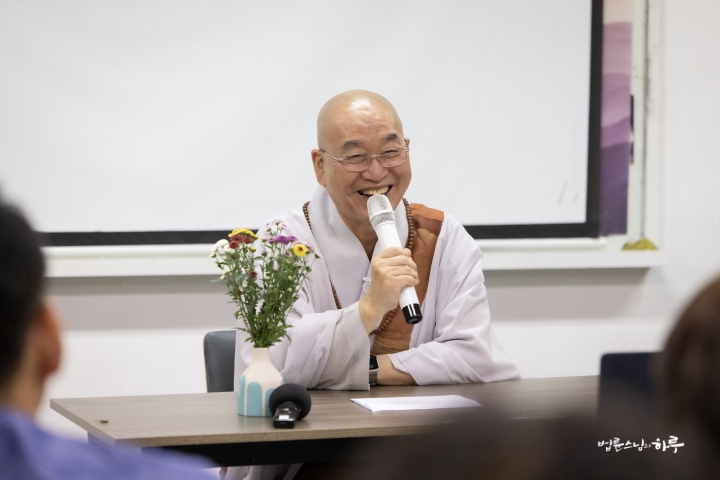
“Dear Korean expatriates in Hanoi, Vietnam, we were planning to have all of you participate in person, see your faces, make eye contact, and have conversations, but due to some circumstances, I’m now seeing you through video. Only some people, mainly those with questions, are participating in person at the venue.
First, I’m very sorry that we couldn’t proceed as planned. Life doesn’t always go the way we want it to. Sometimes loved ones suddenly die, sometimes we suddenly lose our property, but compared to those things, not being able to give a lecture as planned today is not a big problem. In fact, isn’t it more comfortable to listen to the lecture on YouTube at home? You can stretch your legs and even eat snacks while listening. (Laughter)
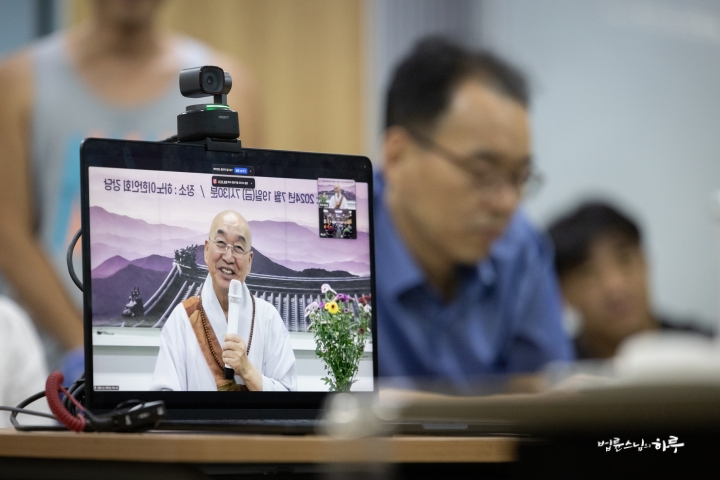
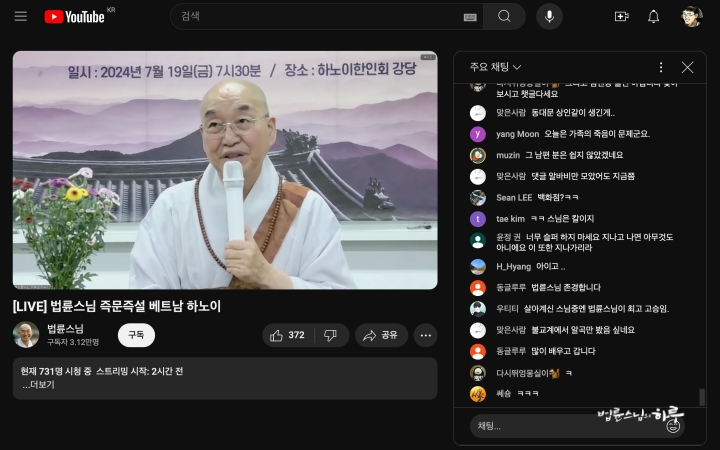
If you only stay in Korea, you might have a lot of complaints about Korea, but if you travel around many countries in the world, is Korea a good country or not?”
“It’s a good country.”
“It’s not just a good country, it’s a country that many people dream of. Even children in Bhutan know about Korea. A person who runs a school in a slum in Dhaka, Bangladesh, recently won the Magsaysay Award. When I visited that school the other day, even first graders knew about Korea. Some children said they watched Korean dramas, some said they liked BTS and Blackpink – even the children in the slums of Bangladesh knew things that I don’t know well. Korea’s reputation is tremendous in Southeast Asia now. When I went to Ho Chi Minh City, even monks said ‘kimchi’ while taking pictures. That’s how much it has become a country that many people aspire to.
The Reason For Feeling Sad While Helping Around The World
Nevertheless, we still haven’t resolved the conflict between South and North Korea, and we’re living in danger where war could break out at any time as the confrontation intensifies. Also, our North Korean compatriots are suffering from various economic difficulties. Until before COVID-19, even though there was conflict between South and North Korea, we could continue to help North Korean residents, help refugees, and settle refugees in Korea. But now all activities have been suspended. In China, border surveillance is very strict, and North Korea absolutely prohibits the import of external goods, so we can’t provide any support now, and it’s also difficult to support refugees. So every time I go to help in other countries, I always feel sad. It’s because we can’t help our own compatriots who are close by while coming far away to help people from other countries. However, we must accept the fact that things in the world don’t always go as we want.”
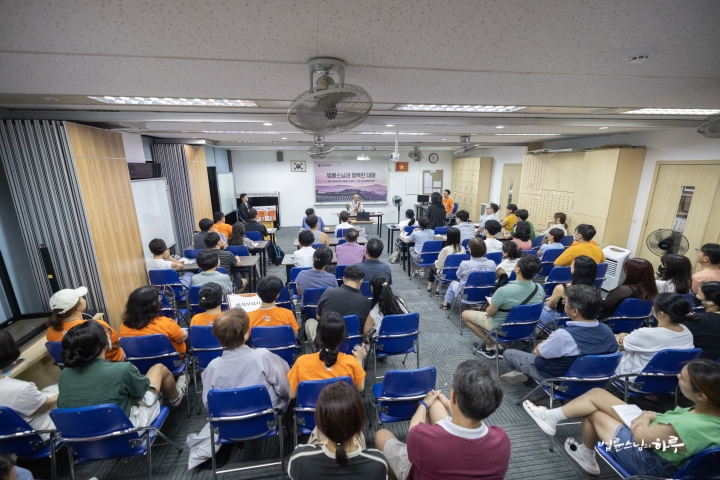
Then, the people present at the venue had a conversation with Sunim. For two hours, seven people asked questions to Sunim. One of them sought Sunim’s advice on what choice to make, saying that the more he dedicates himself to helping others to live a meaningful life, the more his parents’ hearts ache.

The More I Help Others, The More I Hurt My Parents’ Hearts
However, my parents are having a very hard time. My mother now understands a little. But my father seems to be having a very hard time. As the eldest son, I’m still single, and he seems to be worried about how I’m going to manage without getting married or having children. He showed tears in front of me for the first time, and now he’s cut off contact for about 3 months. The more I help others, the more I seem to be driving a nail into my father’s heart. So my heart is very troubled. What choice should I make?”
The questioner asked with a choked voice, saying that his father was heartbroken. Sunim answered.
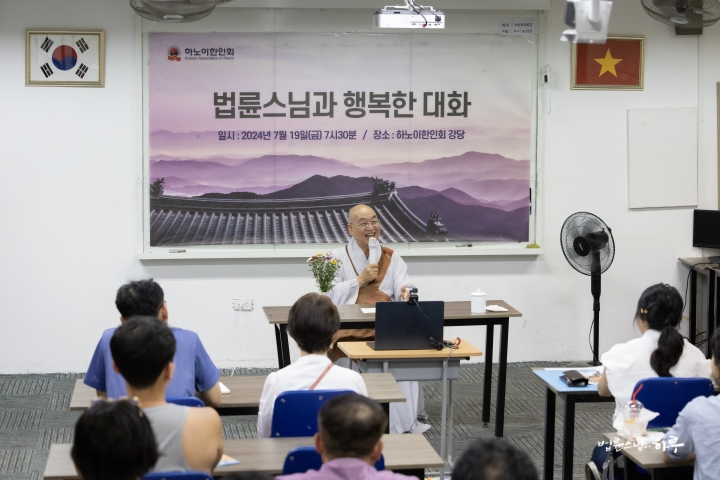
“It would be better to just return to the ordinary life that your father wants. With that level of determination, it’s difficult to sustain activities to help others for a long time. I entered the temple at 17. As a parent, which is more heartbreaking – a son entering a temple or living alone outside and doing volunteer work?
Usually, when a son enters a temple, the mother comes to the temple and says, ‘Do you want to see me die? If you don’t leave the temple now, I’ll take poison and die,’ or ‘How can you save all sentient beings when you can’t even save your parents from suffering?’ This is something even the Buddha experienced. When the Buddha said he wanted to renounce the world, his parents strongly opposed it. In the end, he left after getting married and having a child. From a worldly perspective, he was supposed to be the next king to succeed the country, but he left it behind. If the husband had died, the wife could have remarried, but because he became a practitioner while alive, it was difficult for the wife to remarry. From the perspective of the Buddha’s son, it’s as if his father left home after giving birth to him. From the perspective of human ethics, the Buddha was extremely unfilial. But why do we say the Buddha is great?
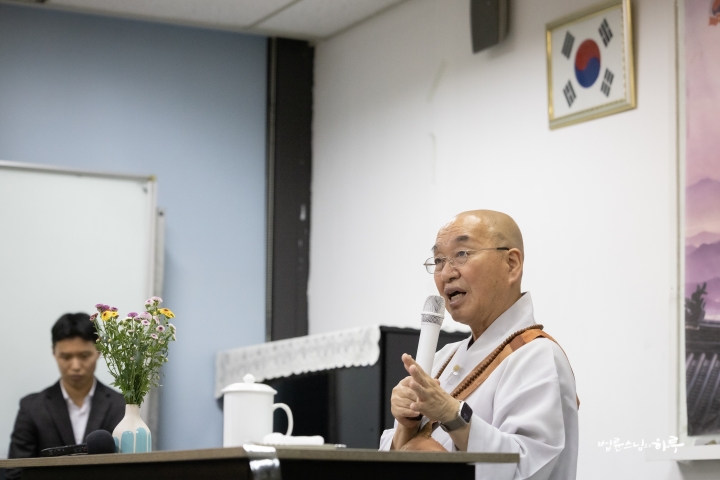
A mother’s passing is her own life as an adult. My choosing my own path is my life. If children always have to obey their parents, how can they be free individuals rather than slaves to their parents? Whether slaves to a king, master, or parents, they are all slaves. If you can’t make decisions about your own life, you’re a slave. The questioner seems to think they’ve made some grand decision, but from my perspective, their attitude as the master of their own life is unclear. That’s why I said from the beginning that at that level, they should just go back.
The questioner shouldn’t steal their father’s property, get rid of household items, or cause their father to be cursed. However, they’re not hitting their parents, stealing from others, sexually harassing anyone, committing fraud, using abusive language, or causing trouble while drunk. What’s wrong with living my own life? There’s no reason to think “I’ve sinned” just because someone opposes that path and I can’t follow their wishes. If a woman liked me and clung to me saying “Let’s get married” and “How can you save all sentient beings when you can’t even save one woman?”, should I get married? The questioner is having absurd thoughts right now. They’re making excuses.
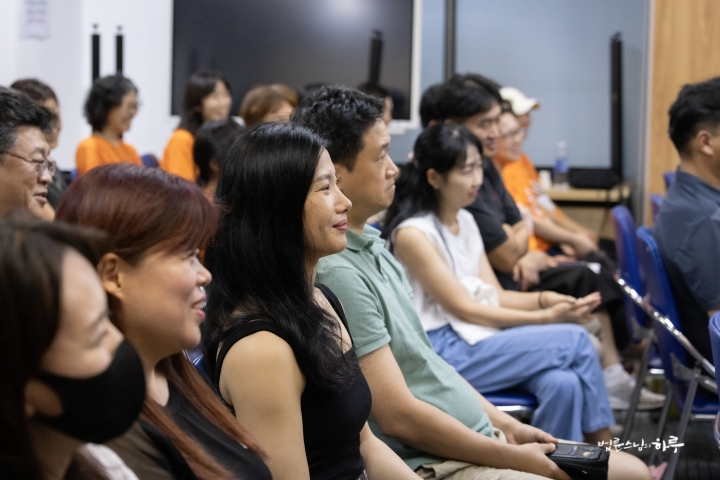
The idea of volunteering to help others isn’t that great either. Volunteering for others means sacrificing yourself for others, and when people make sacrifices, they always want others to recognize that sacrifice. If no one acknowledges what you’ve done, you may later feel that life is meaningless and regret, thinking “Did I do something crazy?”
If I have 1 thousand dollars and use it to eat delicious food at a restaurant, drink good alcohol at a bar, and hang out with friends, there’s a joy in that. The satisfaction gained from fulfilling my desires is expressed as “pleasure.” But it might be more rewarding for me to share food with 100 hungry people. It might be more rewarding for me to buy clothes for 100 people without clothes than to buy one expensive outfit for myself. This feeling of fulfillment from helping others is expressed as “satisfaction.” There are these two types of happiness for humans.
However, the pleasure from fulfilling desires is only momentary. You might regret it later or feel empty. But the feeling of satisfaction lasts for a long time even as time passes. Will you seek satisfaction by fulfilling desires? Or will you live doing rewarding things? This is a matter of my choice.
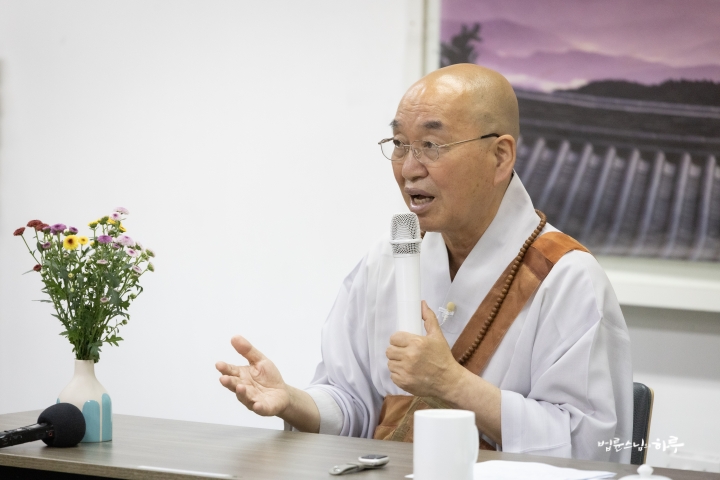
However, to stay on the latter path for a long time, you must not be swayed by whether people recognize it or not, or by what people say. If you go that path for the sake of others, you will inevitably feel betrayed or regret later. That’s why it’s dangerous.
The Buddha’s teaching is, first, to do things that help others rather than pursuing your own interests. Second, that this is actually the path for yourself. If you have this perspective, you won’t suffer later. In the Diamond Sutra, this is expressed as “giving without attachment to form.” It’s like giving a glass of water to someone who is thirsty without expecting anything in return. If you do this, you won’t suffer later. Usually, when people help others, they always expect something. They might not expect money, but they expect praise or some kind of recognition. If that reward doesn’t come, they inevitably feel betrayed or regret. So if you want to go down the path of helping others, you need to let go of the thought that you’re doing it for others. You should have the perspective of “How will I live my life? I find this kind of life more rewarding.”
Because I mainly travel by low-cost airlines and stay in simple accommodations, people often say I’m admirable or a bit stingy. But when I do relief work in poor areas, I’m not really affected by such evaluations. In those places, even $10 can support children, and $100 can help many people. If I buy a low-cost airline ticket that requires one more transfer, I can save $300 compared to a direct flight. Whether I rest after arriving early or rest at the airport in between, isn’t it the same? If I save like that, I can help a few more poor children, so why not do it?
It’s the same with accommodations. There might be a difference on that evening between a $100 room and a $10 room, but looking back later, there’s not much difference. When you look back after a year, does it matter how nice a room you stayed in? Not at all. With meals too, there might be a difference now between eating bulgogi or ramen for dinner tonight, but looking back after a year, it’s hard to even remember what you ate today.
If you have these experiences a few times, you can understand what’s important in life. If I live frugally and save just a little, I can benefit more people and make changes in their lives.
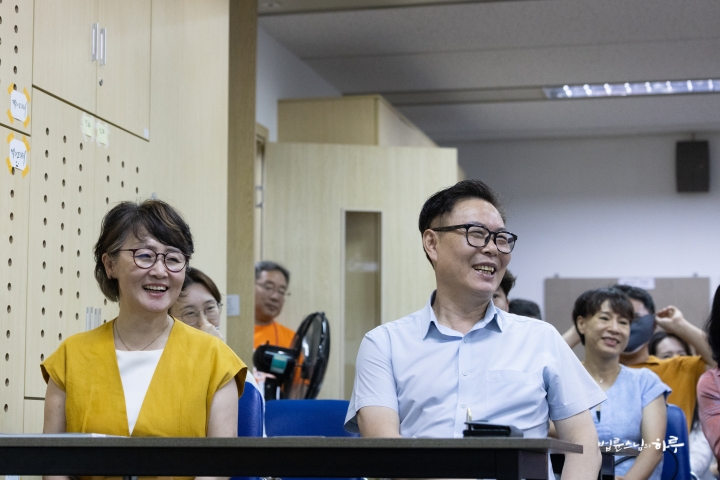
That’s why I live this way. Not because I’m living this way for poor children, but because I myself prefer helping them. Without this perspective, you keep falling into self-contradiction. Some religious people tell others to help the poor, and they teach using the example of the Buddha sleeping under a tree. When it’s revealed that these people live in nice houses or have a lot of wealth, people criticize them. But I rather pity them. How much must they suffer, trapped in their own contradictions? Also, because they have something to hide from others, they always live watching others’ reactions.
You all like to buy and wear expensive, nice clothes, right? But when you’re wearing such clothes, can you sit anywhere on the street if your legs hurt? You can’t because you’re afraid of ruining your clothes. So it’s better to wear moderate clothes. If you take public transportation or drive a moderate car, you can stop anywhere and buy something to eat when you’re hungry. But if you drive a very luxurious car, it’s difficult to park anywhere and buy street food when you’re hungry. You can’t do that because you have to maintain your dignity. Like this, wearing expensive clothes and driving expensive cars isn’t always good; it can actually make your life inconvenient.
Why should we live bound by such things, and why should we care about others’ opinions? When this point is somewhat settled, you can live comfortably while volunteering. If not, there’s a high possibility you’ll regret it before long. The questioner choked up saying their father was heartbroken, but with that level of resolve, it’s difficult to live a lifetime helping others. That’s why I said it would be better to just go back. If you want to live helping others, you should at least clearly have the perspective that ‘I live this way because it’s good for me.’
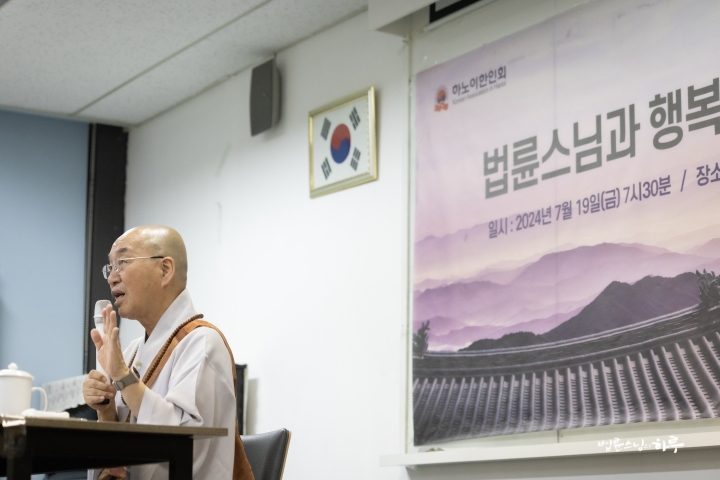
In the time of the Buddha, there was a country called “Varanasi.” In the richest household in Varanasi, there was an only son named Yasa. In modern terms, we could call it a chaebol family. Yasa, the only son of this family, met the Buddha and became a monk. So his father searched for his missing son and finally learned that his son had become a monk. Worried, Yasa’s father went to find his son and said:
“Even if many young people in this world become monks, you can’t. How can someone like you, who grew up luxuriously in a rich household, live in fields teeming with poisonous insects and wild beasts? Your mother is also pleading with tears. Let’s quickly return home.”
Then Yasa replied:
“Father, look at my face. Don’t I look more comfortable now than when I was enjoying pleasures at home?”
Only then did Yasa’s father realize, looking at his son’s face, that it had become much clearer and brighter than before. Yasa continued:
“Why should I return to that place of suffering, leaving this good place?”
Yasa’s father worried about his son’s clothes, bedding, food, etc., while Yasa talked about happiness. Yasa’s father was left speechless. Eventually, at Yasa’s urging, Yasa’s father listened to the Buddha’s words and gained enlightenment. He didn’t become a monk but lived as a lay practitioner for the rest of his life.
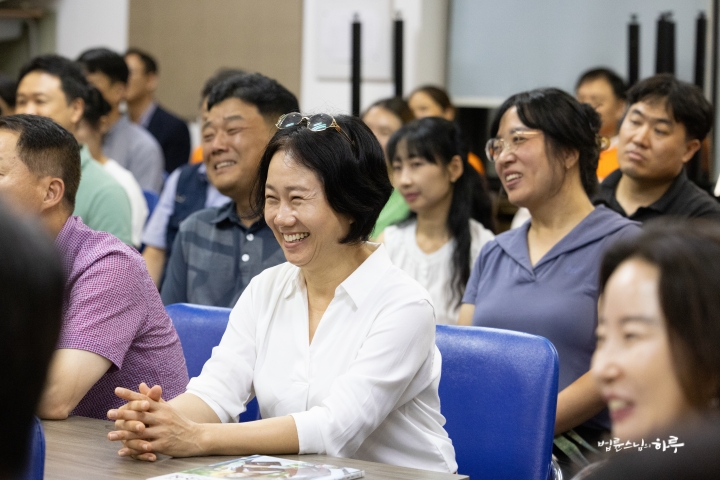
In the Buddha’s time, Kapilavastu, where the Shakya clan lived, was a small kingdom. It was a kingdom ruled by the Shakya clan. The Buddha’s father was the king of that place, and the Buddha was the crown prince who would become the next king. But when the Buddha became a monk, his father, King Suddhodana, always lived in anxiety. Then one day, he heard the news that his son had attained enlightenment and become a great teacher. Also, he returned to his hometown to teach the Dharma, and many people gained enlightenment. At that time, even servants in the palace gained enlightenment, to the extent that many people were enlightened, but King Suddhodana, the Buddha’s father, was not at all. So many people were puzzled. King Suddhodana was the most respected person in Kapilavastu, and they thought that such a king could gain enlightenment with just one word from the Buddha. But even though many people gained enlightenment, King Suddhodana could not. So one day, a disciple asked the Buddha:
“Why doesn’t King Suddhodana gain enlightenment even after hearing the Dharma?”
Then the Buddha smiled and said:
“King Suddhodana only has a son, not a Buddha.”
Looking at King Suddhodana’s image recorded in the scriptures, there are only stories of him always worrying about his son. King Suddhodana only worried about what the Buddha ate, what clothes he wore, where he slept. Like this, to King Suddhodana, the Buddha only appeared as a son. He never lent an ear to the Buddha’s teachings. How could such a King Suddhodana gain enlightenment?
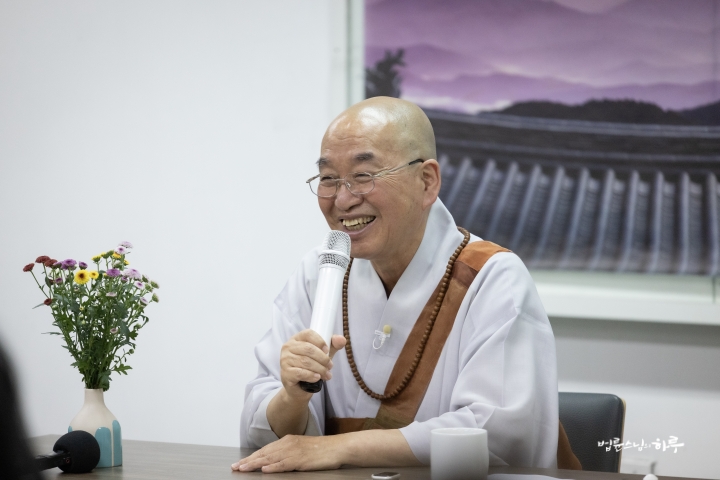
Parents are good protectors when children are young. But when they become adults, parents mostly become big obstacles to their future. If love is putting 10 logs on the fire in cold winter, in hot summer, love is not lighting a fire. If you put 10 logs on the fire in hot summer, it would be too hot to bear. We torment our children with such overprotection. When children are young, they should be cared for warmly, and when they grow a bit and reach puberty, they should be watched quietly. We should give them opportunities to accumulate experience through trial and error on their own. They need to experience dating, regret, and falling down directly. Only then will they develop independence when they become adults. If parents block these opportunities, children will end up not knowing how to do anything on their own. These days, some parents arrange marriages for their children, find houses for them, find jobs for them. When grandchildren are born, they even take care of those children. They receive the consequences of raising them like that for their entire lives until they die.
In that sense, the questioner’s parents seem to see the questioner as a little child. They’re worried about their child. If they had felt that their child was very dignified and mature in all aspects, including their behavior at home and work life, they wouldn’t have reacted like that. But because they don’t trust you, they keep saying such things. If you had shown them that you clean when you go to your parents’ house, comfort them, and take care of various things, they would have felt reassured, thinking “Now you can take care of yourself.” But the image you’ve shown them so far is not trustworthy, so they keep saying such things.
However, there’s no need to blame your parents, nor do you need to be bound by such words. You can accept it like “Parents can think that way. I understand well” and live your own life. If you keep thinking “Am I being unfilial?” because your parents say that, it proves that you haven’t become an adult yet.”
“Thank you. I understand well.”
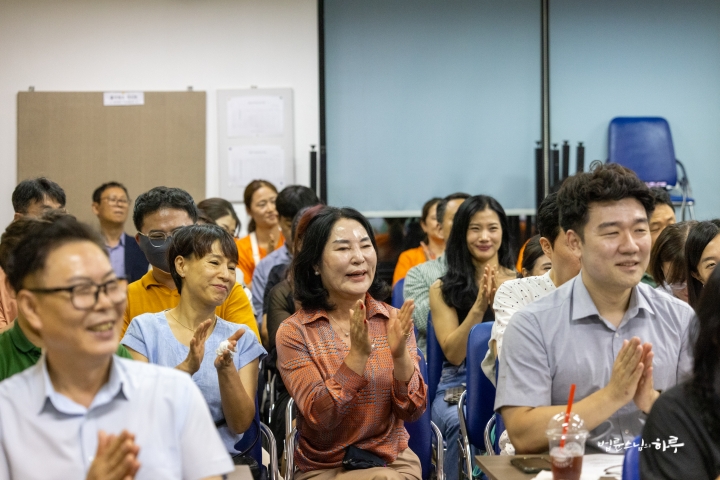
The questions continued.
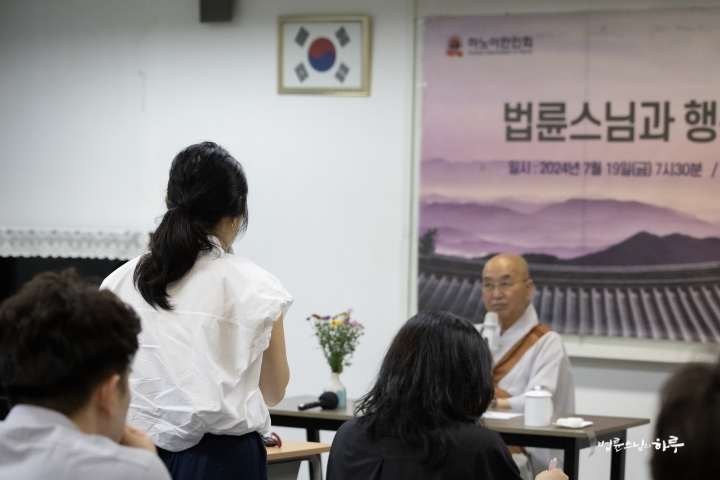
• I’ve lived in Vietnam for 10 years, but I feel empty because I don’t have any significant achievements left.
• My heart aches because my mother went to a nursing home. How can I comfort my mother who is alone in the nursing home?
• These days, communication between people seems to be decreasing and becoming more desolate. How can we wisely manage our minds in this situation?
• How can we overcome the occasional feeling of life’s futility?
• Even though my child is still in lower grades, he asks questions about why we are born, why we die, and the purpose of life. How should I answer?
• It’s been 20 months since I sent my husband to heaven. How can I overcome my longing for my husband and how should I live from now on?
When the conversation ended, it was 10 PM. As he wrapped up the lecture, Sunim shared the news that the General Secretary of the Communist Party of Vietnam had just passed away.
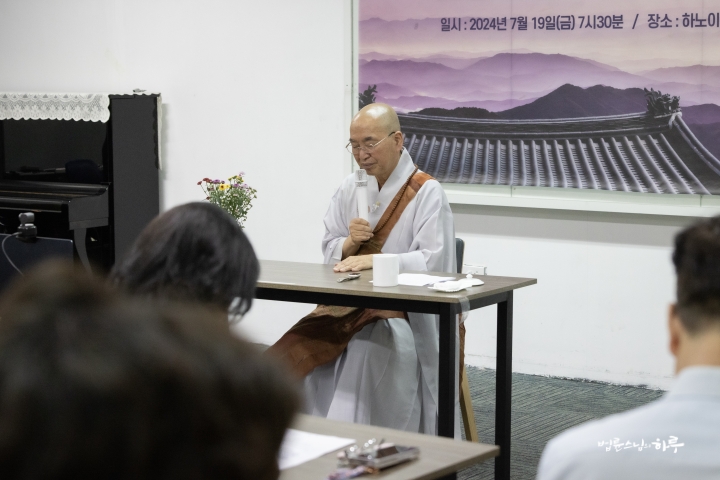
“Just before we started the Dharma Q&A today, I heard that the highest leader of Vietnam, the General Secretary, has passed away. Since you all live here in Vietnam, let’s have a moment of silence to pray for the deceased. Moment of silence.”
After a quiet moment of silence, the lecture ended.
Sunim took a commemorative photo with the volunteers who prepared for the lecture and expressed his gratitude.
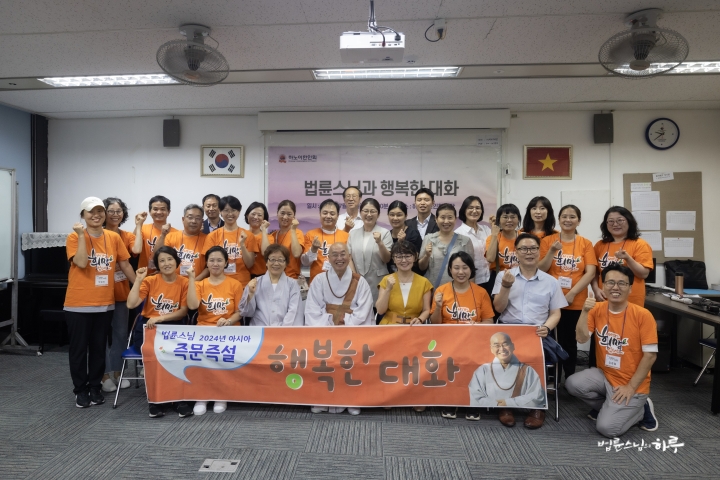
“Thank you.
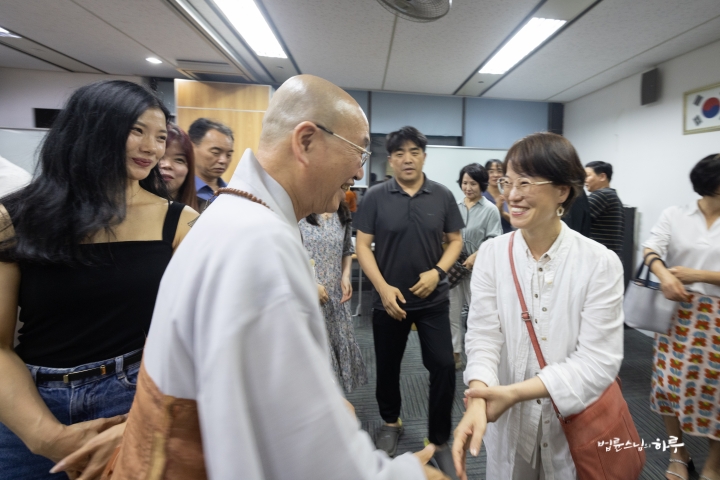
Sunim shook hands with the Korean expatriates, said goodbye, and moved to his accommodation. It was another long day.
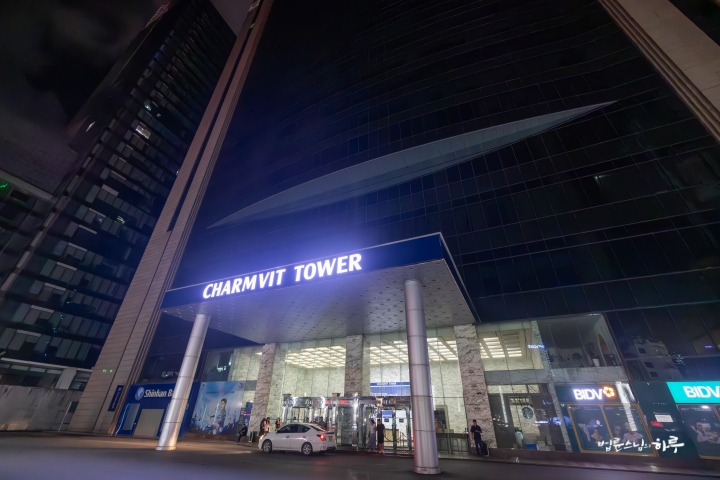
Tomorrow morning, Sunim will visit Quan Su Temple, where the 1st Secretariat of the Vietnamese Buddhist Sangha Council is located, to have a Dharma Q&A with the monks. In the afternoon, he will visit Tay Thien Temple to have a Dharma Q&A with the monks in retreat. In the evening, he will move to Hanoi Airport and depart for Korea on a night flight.
A Day in the Life of Sunim was translated by AI.




